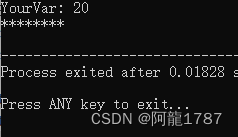记录C++中,子类同名属性并不能完全覆盖父类属性的问题
问题代码:
首先看一段代码:很简单,就是BBB继承自AAA,然后BBB重写定义了同名属性,然后调用父类AAA的打印函数:
#include <iostream>
using namespace std;
class AAA {
public:
AAA() {}
~AAA() {}
void func() {
YourVar = 20;
}
void print() {
cout << "YourVar: " << YourVar << endl;
}
public:
int YourVar = 10;
};
class BBB : public AAA {
public:
BBB() {
YourVar = 20;
}
~BBB() {}
void print1() {
cout << "YourVar: " << YourVar << endl;
}
void YourMethodOrFunction() {}
private:
int YourVar;
};
int main() {
BBB b;
b.print();
//b.print1();
cout << "********" << endl;
return 0;
}打印结果:

会发现,明明我构造函数里面将YourVar的值改为了20,但是还是打印的10.
这个问题,属于C++的基础问题,我记得,子类继承父类,如果子类中,定义了同名属性的话,那么父类的属性会被隐藏,访问子类的那个属性,就是子类的,不会是父类的。
但是如果父类里面,有一个打印的函数print,会发现,这个print函数,生效的范围,只有父类,不包括子类。只有将父类的print函数重写,才能生效在子类中:
解决思路1:重写print
#include <iostream>
using namespace std;
class AAA {
public:
AAA() {}
~AAA() {}
void func() {
YourVar = 20;
}
void print() {
cout << "YourVar: " << YourVar << endl;
}
public:
int YourVar = 10;
};
class BBB : public AAA {
public:
BBB() {
YourVar = 20;
}
~BBB() {}
void print() {
cout << "YourVar: " << YourVar << endl;
}
void YourMethodOrFunction() {}
private:
int YourVar;
};
int main() {
BBB b;
b.print();
cout << "********" << endl;
return 0;
}打印结果:

虽然解决了问题,但是明明我父类中,写了print函数,干嘛还重新写一次?还有意义?
解决思路2:去掉子类的同名属性
#include <iostream>
using namespace std;
class AAA {
public:
AAA() {}
~AAA() {}
void func() {
YourVar = 20;
}
void print() {
cout << "YourVar: " << YourVar << endl;
}
public:
int YourVar = 10;
};
class BBB : public AAA {
public:
BBB() {
YourVar = 20;
}
~BBB() {}
//private:
// int YourVar;
};
int main() {
BBB b;
b.print();
cout << "********" << endl;
return 0;
}但是有时候,我们就是要这么重写,那么该怎么办呢?
解决思路3:将父类地址传递给子类
#include <iostream>
using namespace std;
class AAA {
public:
AAA() {
YourVar = new int;
*YourVar = 10;
}
~AAA() {
delete YourVar;
}
void print() {
cout << "YourVar: " << *YourVar << endl;
}
protected:
int *YourVar;
};
class BBB : public AAA {
public:
BBB() {
// 将父类地址传递给子类
YourVar = AAA::YourVar;
*YourVar = 20;
}
~BBB() {}
private:
int *YourVar;
};
int main() {
BBB b;
b.print();
cout << "********" << endl;
return 0;
}解决思路4:将子类地址传递给父类:
#include <iostream>
using namespace std;
class AAA {
public:
AAA() {
// YourVar = new int;
// *YourVar = 10;
}
~AAA() {
delete YourVar;
}
void print() {
cout << "YourVar: " << *YourVar << endl;
}
protected:
int *YourVar;
};
class BBB : public AAA {
public:
BBB() {
YourVar = new int;
// 将子类地址传递给父类
AAA::YourVar = YourVar;
*YourVar = 20;
}
~BBB() {}
private:
int *YourVar;
};
int main() {
BBB b;
b.print();
cout << "********" << endl;
return 0;
}总结
1. 面对这样的情况,要么就不要写同名属性(但有时候不能保证自己忘记了)
2. 当以后继承的类层次很多的时候,难免会定义同名属性,但是父类的函数,是不会访问子类的同名属性的,这个是这个问题的关键。虽然在子类中,父类的属性确实是隐藏了,但隐藏不代表消失,也不代表父类的函数中,也将这个属性给隐藏或者替换了。
3. 要么就使用指针,将父类和子类的地址变成一样的地址。
4. 虽然最后一种比较麻烦,但是会惊奇的发现,如果是指针的话,可以实现父类中实现所有操作,子类只管创建对象和使用,子类如果想改实现,根据需要同名替代即可。甚至属性也可以写成函数指针那些,是一种非常灵活的使用方式,是一种上层设计模式的简单体现。
#include <iostream>
using namespace std;
class AAA {
public:
AAA() {
// YourVar = new int;
// *YourVar = 10;
}
~AAA() {
delete YourVar;
}
void print() {
cout << "YourVar: " << *YourVar << endl;
}
protected:
int *YourVar;
};
class BBB : public AAA {
public:
BBB() {
YourVar = new int;
// 将子类地址传递给父类
AAA::YourVar = YourVar;
*YourVar = 20;
}
~BBB() {}
void print() {
cout << "*********************" << endl;
cout << "YourVar: " << *YourVar << endl;
cout << "*********************" << endl;
}
private:
int *YourVar;
};
int main() {
BBB b;
b.print();
return 0;
}
